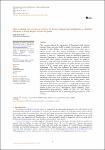| dc.description.abstract | This research explored the contribution of Functional Adult Literacy training (FAL) and what it did to women’s involvement in children’s education in Apac District. The main objective of this study was to explore whether and how women participants in Lango Region supported their children’s education from the skills acquired from FAL training. A study of 7 participants based on qualitative interpretive framework intended to examine the benefits reaped by FAL-trained women after their positive perception and support to children’s education. Using individual in-depth and key informant interviews based on qualitative content analysis, the study indicates that women trained in FAL became active agents of their socio and economic development. The study was influenced by Kabeer's socio-economic perspective and Freire's literacy perspective, both of which emphasize the importance of conscientisation in making marginalized non-literates actors of socio-economic progress. Women who participated in FAL obtained abilities that vividly improved their lives, according to the conclusions, which were based on facts or witnessed evidence inductively derived from the participants. Furthermore, the women gained a better understanding of their role and influence on their children's academic achievement, perseverance, and success as a result of the practical skills. Therefore, this study recommends that key stakeholders like, Ministry of Gender, Labour and Social Development, global supporters, (Non-Governmental Organisations) NGOs as well as Civil Society Organisations should prioritise in supporting putting into practice FAL training. | en_US |

